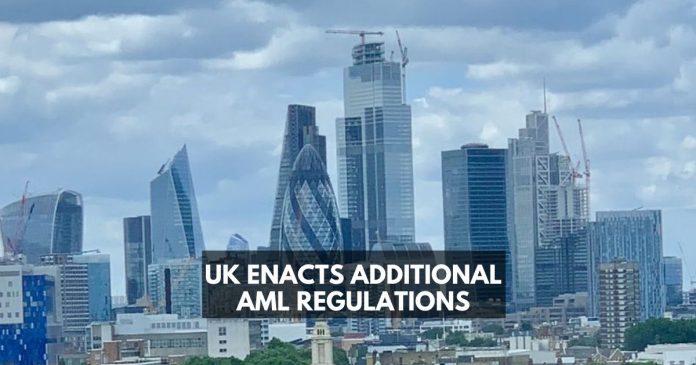The United Kingdom’s finance and economics department has announced the addition of new Anti-Money Laundering (AML) regulations.
According to the announcement, the new AML regulation was launched in a bid to combat the ever-increasing risks associated with crypto transactions and networks.
The UK Finance and Economics Department said the additional measures put in place would reduce the risk of laundering and other crypto-related crimes.
Therese Chambers, Director of Retail and Regulatory Investigations, in a speech on March 6, said the new Money Laundering Regulations (MLR) position the UK’s Financial Conduct Authority (FCA) as the Anti-Money Laundering overseer for some crypto objectives.
She said, these new regulations go beyond the 5th Anti-Money Laundering Directive (5AMLD) and include a broader set of activities, including ICOs, as recommended by FATF in 2019. The 5AMLD was entered as law by the EU in July 2018 and came into effect on January 10, 2020.
Crypto associated with money laundering
Chambers claims cryptocurrencies and crypto-related businesses are associated with money laundering because they allow anonymous financial transfers.
She explained that the FCA’s regulatory oversight mainly focuses on the business dealings within the crypto space.
The MLRs apply to exchanges that offer fiat pairings, and those that deal in crypto pairings. Custodial wallet providers, ICOs, IEOs, and crypto ATMs are also included.
Pawel Kuskowski, CEO of Coinfirm, argued that the new regulations mean that banks can no longer shut crypto out.
Chambers noted that any crypto operating firm must possess FCA risk assessment, customer due diligence, transaction monitoring, record-keeping as well as suspicious activity reporting.
AML regulations chasing crypto businesses
Crypto firms have been leaving the UK and EU because of their continuous stringent regulations on crypto firms.
The EU enacted new AML regulations in July 2018, called the 5th Anti-Money Laundering Directive (5AMLD). The 5AMLD rules led several crypto exchanges to leave UK and EU related countries.
Most recently, Simplecoin and Chopcoin, both crypto platform, closed shop due to the EU’s AML regulations.
Simplecoin explains that the EU’s latest AML and KYC regulations were the reason crypto businesses are leaving.
The exchange pointed out that these requirements are against the fundamental principles of cryptocurrencies, such as privacy and decentralization.




























